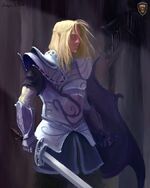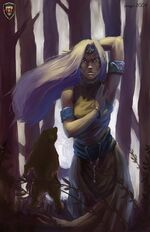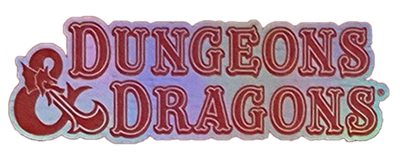![]() This article only cites references or sources for parts of it. Please help improve this article by adding citations to sources.
This article only cites references or sources for parts of it. Please help improve this article by adding citations to sources.
Elves mingle freely in human lands, always welcome yet never at home there. They are well known for their poetry, dance, song, lore, and magical arts. Elves favor things of natural and simple beauty. When danger threatens their woodland homes, however, elves reveal a more martial side, revealing skill with sword, bow, and battle strategy.
Personality[]
Elves are more often amused than excited, and more likely to be curious than greedy. With such a long life span, they tend to keep a broad perspective on events, remaining aloof and unfazed by mere happenstance. When pursuing a goal, however, whether an adventurous mission or learning a new skill or art, they can be focused and relentless. They are slow to make friends and enemies, and even slower to forget them. They reply to petty insults with disdain and serious insults with vengeance.
Physical Description[]


Elves are short and slim (not all), standing about 4-1/2 to 5-1/2 feet tall and typically weighing 95 to 135 pounds, with elf men the same height and only marginally heavier than than elf women. They are graceful but frail. They tend to be pale-skinned and dark-haired, with deep green eyes. elves have no facial or body hair. They prefer simple, comfortable clothes. especially in pastel blues and greens, and they enjoy simple yet elegant jewelry. Elves possess unearthly grace and fine features. Many humans and members of other races find them hauntingly beautiful. An elf reaches adulthood at about 110 years of age and can live to be more than 700 years old.
Elves do not sleep, as members of other common races do. Instead, an elf meditates in a deep trance for four hours a day. An elf resting in this fashion gains the same benefit that a human does from 8 hours of sleep. while meditating, an elf dreams, though these dreams are actually mental exercises, that have become reflexive through years of practice. The Common word for an elf's meditation is "trance", as in "four hours of trance."
Relations[]
Elves consider humans rather unrefined, halflings a bit staid, gnomes somewhat trivial, and dwarves not at all fun. They look on half-elves with some degree of pity, and they regard half-orcs with unrelenting suspicion. While haughty, elves are not particular the way halflings and dwarves can be, and they are generally pleasant and gracious, even to those that fall short of their standards (a category that encompasses just about everybody who's not an elf).
Alignment[]
Since elves love freedom, variety, and self-expression, they lean strongly toward the gentler aspects of chaos. Generally, they value and protect others' freedom as well as their own, and they are more often good than not.
Elven Lands[]
Most elves live in woodland clans numbering less than two hundred souls. Their well-hidden villages blend into the trees, doing little harm to the forest. They hunt game, gather food, and grow vegetables, and ther skill and magic allow them to support themselves amply without the need for clearing and plowing land. Their contact with outsiders is usually limited, though some few elves make a good living trading finely worked elven clothes and crafts for the metals that elves have no interest in mining.
Elves encountered in human lands are commonly wandering minstrels, favored artists, or sages. Human nobles compete for the services of elf instructors, who teach swordplay to their children.
Religion[]
Above all others, elves worship Corellon Larethian, the Protector and Preserver of life. Elven myth holds that it was from his blood, shed in battles with Gruumsh, the god of the orcs, that the elves first arose. Corellon is a patron of magical study, arts, dance, and poetry, as well as a powerful warrior god.
Language[]
Elves speak a fluid language of subtle intonations and intricate grammar. While Elven literature is rich and varied, it is the language's songs and poems that are most famous. Many bards learn Elven so they can add Elven ballads to their repertoire. Others simply memorize Elven songs by sound. The Elven script, as flowing as the spoken word, also serves as the script for Sylvan, the language of pixies and dryads, for Aquan, the language of water-based creatures, and Undercommon, the language of drow and other subterranean creatures.
Names[]
When an elf declares herself an adult, usually sometime after her hundredth birthday, she also selects a name. Those who knew her as a youngster may or may not continue to call her by her "child name" and she may or may not care. An elf's adult name is a unique creation, though it may reflect the names of those she admires or the names of others in her family. In addition, she bears her family name. Family names are combinations of regular Elven words; some elves traveling among humans translate their family names into Common, while others use the Elven version.
Child Names[]
- Arya
- Bryn
- Del
- Eryn
- Faen
- Innil
- Mella
- Naill
- Naeris
- Phann
- Rael
- Rinn
- Sai
- Syllin
- Thia
- Vall
Male Names[]
- Aramil
- Aust
- Enialis
- Heian
- Himo
- Ivellios
- Laucian
- Quarion
- Soveliss
- Thamior
- Tharivol
Female Names[]
- Anastrianna
- Antinua
- Drusilia
- Felosial
- Ielenia
- Lia
- Mialee
- Qillathe
- Silaqui
- Vadania
- Valanthe
- Xanaphia
Family Names (Common Translations)[]
- Amastacia (Starflower)
- Amakiir (Gemflower)
- Galanodel (Moonwhisper)
- Holimion (Diamonddew)
- Liadon (Silverfrond)
- Meliamne (Oakenheel)
- Nailo (Nightbreeze)
- Siannodel (Moonbrook)
- Ilphukiir (Gemblossom)
- Xiloscient (Goldpetal)
Adventurers[]
Elves take up adventuring out of wanderlust. Life among humans moves at a pace that elves dislike: regimented from day to day but changing from decade to decade. Elves among humans, therefore, find careers that allow them to wander freely and set their own pace. Elves also enjoy demonstrating their prowess with the sword and bow or gaining greater magical powers, and adventuring allows them to do so. Good elves may also be rebels or crusaders.
Template:SRD-elves
